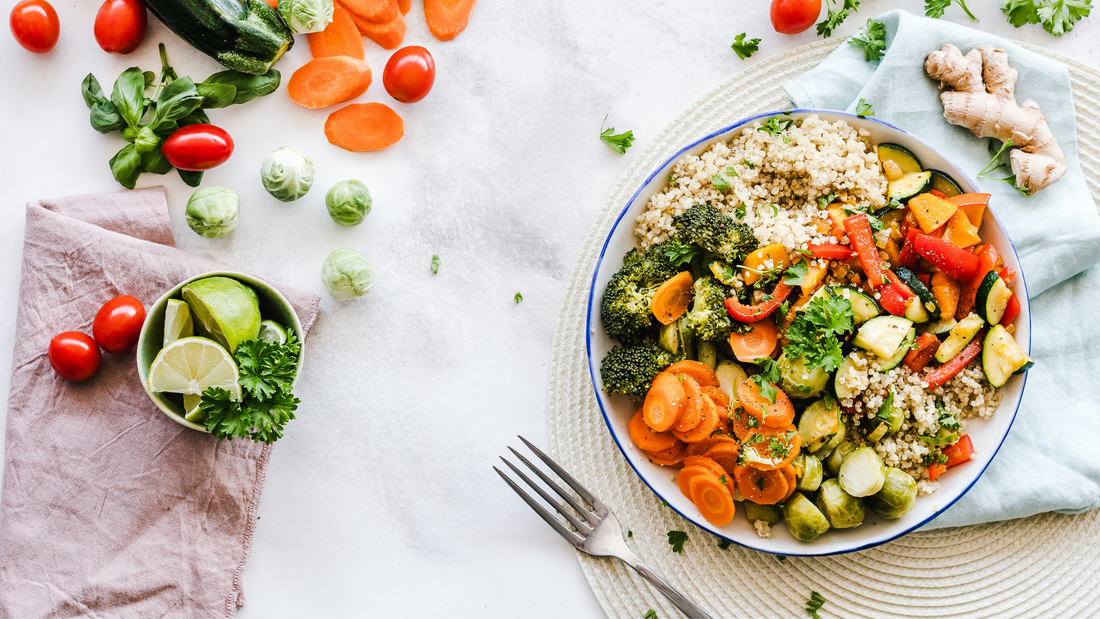Want healthier skin? Nutrition plays an important role

Many of us are concerned with not only our general health but also the health of our skin. Good nutrition can help us maintain an attractive complexion, as well as look and feel healthy.
Research shows that skin health and overall well-being can be enhanced by eating a diet rich in fruits, vegetables, nuts, whole grains and oily fish.
We have compiled a list of foods, nutrients and vitamins which can contribute to your skin looking healthier:
Antioxidants
A diet containing good levels of antioxidants can help protect our cells by neutralising the effects such as pollution, the sun's ultraviolet (UV) rays, wind and changes in temperature. Antioxidants also protect collagen, elastin cells and tissue from being damaged. The most common antioxidants are vitamins A, C and E.
Vitamin A
Vitamin A is necessary for the maintenance and repair of skin tissue. It promotes the growth of collagen, which helps the skin stay firm. It's also responsible for the growth and regeneration of skin cells, which help form the protective layers of the skin. These protective layers guard against certain skin conditions including psoriasis and dry skin.
Vitamin A also helps protect against photo damage, which results from prolonged exposure to UV rays. It can also play an important role to suppress the glands that produce oils and may decrease the occurrence of acne.
Vitamin A can be found in foods including eggs and brightly coloured foods such as carrots, sweet potato, apricots and leafy green vegetables such as kale, broccoli and spinach.
Vitamin B
Biotin (vitamin B7) is needed for energy metabolism. A deficiency in Biotin may cause dermatitis (an itchy, scaly skin condition). On the other hand, high biotin levels can contribute to raised blood cholesterol levels. Maintaining adequate levels of vitamin B7 is particularly important.
Niacin (vitamin B3) is essential for the body to convert carbohydrates and fat into energy. It can help our skin retain its moisture and make our complexion look plumper and younger. It also helps the nervous and digestive systems remain healthy.
Pyridoxine (vitamin B6) helps convert food into energy and metabolise fats. It also aids in the production of antibodies to fight disease, as well as promoting the optimum functioning of our hormonal and nervous systems.
Vitamin B can be found in egg yolks, wholemeal grains, seeds (especially sesame seeds), legumes, bananas, mushrooms, tuna, oatmeal and cereals.
Vitamin C
Vitamin C is one of the many antioxidants that exist in our bodies, but our body cannot make its own vitamin C.
Vitamin C foods are necessary for the creation and maintenance of collagen, which is a protein that maintains skin elasticity. It is also needed for the growth and repair of tissues in all parts of our body.
Citrus fruits such as oranges, lime and lemon, but also strawberries, tomatoes, sweet peppers, green peas, broccoli and leafy greens are also a good source of vitamin C.
Calcium and Vitamin D
Calcium is the most plentiful mineral found in the human body. Strong and healthy bones and teeth are maintained with the help of calcium, making it an essential nutrient for us all. It is also important for other physical functions, such as muscle control and blood circulation.
Vitamin D plays an important role as it helps our body absorb calcium. A number of foods include vitamin D, but our bodies can also make vitamin D when our skin is exposed to sunlight.
It is important to remember that only a few minutes of sunlight every day are sufficient to provide us with enough vitamin D.
When spending time outdoors in the sun, we recommend that you protect your skin by applying sunscreen or wearing UPF50+ sun protective clothing and a hat. These will block radiation that causes skin cancer and melanoma. Doctors often recommend vitamin D supplements to their patients if they are deficient.
Dairy products (such as milk, cheese and yoghurt) are a good source of calcium.
Vitamin D is prevalent in cheese, egg yolks, beef liver, fatty fish, such as tuna, mackerel and salmon.
Vitamin E
In combination with vitamin A, vitamin E is said to be a key vitamin for healthy skin - particularly in preventing skin ageing and the formation of wrinkles. Vitamin E does this by fighting toxins that enter the body from processed foods, pollution and sun exposure.
Avocados, nuts, eggs and oatmeal all have good levels of vitamin E.
Iron
The most common nutrient deficiency in women is iron. In some cases, it can lead to anaemia, dizziness, tired muscles and a lack of concentration.
Iron assists in transporting oxygen around the body, allowing energy to be produced for our day-to-day activities (as well as internal processes, such as digestion). It also aids in the creation of red blood cells.
Green vegetables, nuts, grains, lentils and beans are all a good source of iron.
In conclusion, doctors recommend that the best way to maintain a healthy level of each vitamin is to cook meals that include vitamin-rich foods and avoid processed foods where possible.
In addition to maintaining a healthy diet, we encourage our Solbari community to exercise regularly and enjoy the outdoors whilst protecting their skin.
Solbari Sun Protection offers an award-winning range of UPF 50+ sun protective clothing, broad brim sun hats, UV arm sleeves and sun block umbrellas.
You can find out more about Solbari's certified UPF50+ sun protective range by clicking the links below:
Women UPF 50+
Men UPF 50+
Sun Hats UPF 50+
Accessories UPF 50+
SPF 50+ Sunscreen
Skin Check App












